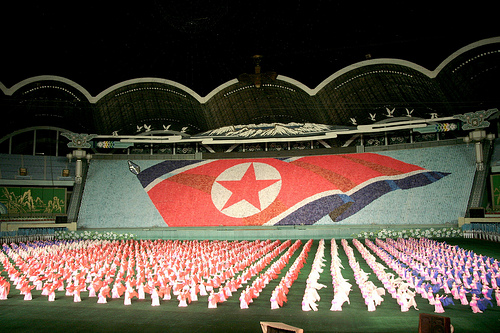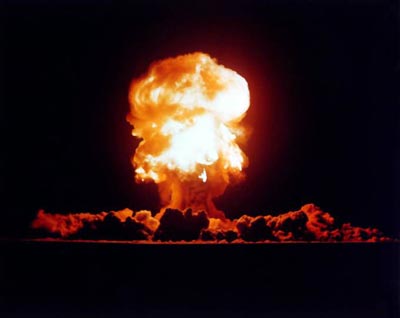Now that North Korea has tested a second nuclear bomb?
Are you still happy about Obama and Hillary Clinton being in charge of our foreign policy?Not at all.
0bama will talk.. . just like Neville Chamberlain.


Speaking at a news conference with South Korean President Lee Myung Bak, Obama warned that the U.S. and its allies are discussing possible new penalties against Iran for rejecting a United Nations-backed plan that would halt its nuclear program.
Since Iran has been foot-dragging in accepting the U.N. proposal, "we have begun discussions with our international partners about the importance of having consequences," he said.
"Over the next several weeks, we will be developing a package of potential steps that we could take that will indicate our seriousness to Iran," Obama added.
The U.S. is meeting Friday in Brussels with five other nations — Britain, China, France, Russia and Germany — to discuss what measures could be used against Iran, European Union foreign affairs spokeswoman Cristina Gallach said.
On North Korea, Obama and Lee agreed on a common strategy to reward the reclusive nation with a package of economic assistance only after the North takes a concrete step to eliminate its nuclear weapons program.
Obama also announced that special envoy Stephen Bosworth will make his first trip to North Korea on Dec. 8 to see whether the country is willing to resume nuclear disarmament talks.
Obama warned North Korea against repeating its typical pattern of provocation, followed by on-again, off-again negotiations.
The Bosworth visit, which marks the first direct talks with the communist country of Obama's administration, is "a very symbolic gesture, and the moment the North has been waiting for," said Paik Hak-soon, a North Korea expert at Sejong Institute near Seoul.
Even if North Korean leader Kim Jong Il does resume negotiations, "the sticks are not sharp enough and the carrots are not sweet enough" to persuade the North to drop its nuclear weapons program, said Andrei Lankov, a North Korea watcher at Seoul's Kookmin University.
"The North Korean government is not terribly interested in economic growth. They feel they need nuclear weapons more than money," he said.
The White House played down any expectations of clear-cut breakthroughs during Obama's trip, which also included Japan, Singapore and China. Instead, Obama's visit was meant to mark the U.S. re-engagement with the growing economic region. "We didn't come halfway across the world for ticker-tape parades," senior Obama adviser David Axelrod said Thursday. "We came here to lay a foundation for progress. We've done that."
A presidential trip "is not an immediate gratification business," Axelrod said. "We didn't have expectations that Barack Obama arrives in China or anywhere else and things change overnight. But all this is about moving in the right direction."
Before boarding Air Force One to return to Washington, Obama spoke to U.S. troops at Osan Air Base near Seoul. About 28,500 U.S. servicemembers are in South Korea.
South Korea gave Obama one of the warmest welcomes of the trip. Thousands of people waved flags and cheered the president's motorcade.
His meeting in South Korea also proved to be a relative breeze compared with his stop in China, where Communist Party leaders gave little ground on key issues of economic recovery and climate change. China's government also restricted coverage of Obama's town-hall-style meeting with students, which was designed to win over the Chinese public.
And there is less tension in South Korea over the U.S. military presence than in Japan, where a new administration seeks to renegotiate U.S. arrangements there. Obama's stop at the Osan base was his third visit with U.S. troops during the Asia trip, as he continues to weigh sending more troops to Afghanistan.
US and South Korean envoys were set Tuesday to begin a new diplomatic initiative to bring North Korea back to the nuclear disarmament talks it quit 10 months ago.
The US's special envoy Stephen Bosworth and its chief nuclear negotiator Sung Kim were to leave Tuesday US time for China, South Korea and Japan, the State Department said.
South Korea's chief negotiator Wi Sung-Lac departed for Beijing Tuesday afternoon on a similar mission.
The State Department said the Americans have no plans to meet North Korean officials, and there is no sign Pyongyang is ready to return to the six-nation disarmament forum.
"We are looking for a signal from North Korea, and we?re still waiting for that signal," spokesman P.J. Crowley said Monday.
It was unclear when Bosworth and Sung Kim would be in each country.
China, the communist North's sole major diplomatic and economic ally, is trying to bring it back to the talks hosted by Beijing since 2003.
Senior Chinese party official Wang Jiarui visited Pyongyang this month for talks with leader Kim Jong-Il and China's nuclear negotiators met their North Korean counterparts in Beijing.
But media reports said the North is sticking to its preconditions for returning to dialogue: the lifting of United Nations sanctions and a US commitment to discuss a formal peace treaty on the Korean peninsula.
The United States, South Korea and Japan -- the other members of the talks which also include Russia -- say the North must first return to dialogue and show it is serious about denuclearisation before other issues are dealt with.
"The (Seoul) government maintains that discussions on a peace treaty will be possible only after we make progress in denuclearisation," Wi told reporters.
Yun Duk-Min, professor at Seoul's Institute of Foreign Affairs and National Security, said China was trying to narrow the gap between North Korea and the other countries, notably the United States.
"It remains to be seen how things will end up, as North Korea wants to extort as many gains as possible from others before returning to six-party talks while China plays good cop and the United States bad cop," he told AFP.
But Yun said he believes it would come back to the talks eventually.
Under deals in 2005 and 2007 the North agreed to scrap its nuclear weapons in return for aid and major diplomatic and security benefits, including a formal peace pact.
But the talks became bogged down by disputes over ways to verify disarmament and in April last year the North quit them altogether.
Pyongyang, which tested atomic weapons in October 2006 and May 2009, says it developed nuclear weaponry because of a US threat of aggression, and it must have a peace pact before it considers giving them up.
The 1950-53 Korean War ended only in an armistice. Seoul officials suspect talk of a peace  treaty is an excuse to delay action on the nuclear programme.
treaty is an excuse to delay action on the nuclear programme.


During his two-day stay in Beijing, Wi said he would meet chief nuclear negotiator Wu Dawei, who held the talks with the North Koreans this month.
Either Bosworth or Sung Kim will return to Washington in time for a meeting Friday between Secretary of State Hillary Clinton and South Korean Foreign Minister Yu Myung-Hwan.
South Korea's Yonhap news agency said a senior official of North Korea's ruling party arrived in China Tuesday and may deliver a letter from Kim Jong-Il to President Hu Jintao.
The visit by Kim Yong-Il, director of the party's international department, follows Wang's visit to Pyongyang.


No comments:
Post a Comment